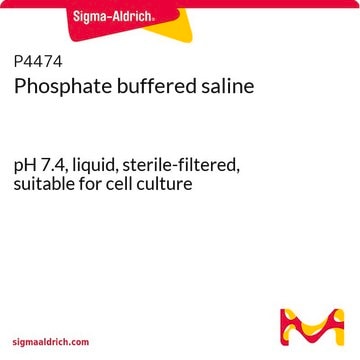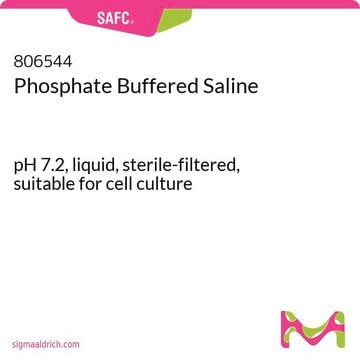P5493
Phosphate buffered saline
10X, solution, pH 7.2-7.6 (25 °C), BioPerformance Certified, for molecular biology
Synonym(s):
PBS
About This Item
Recommended Products
product name
Phosphate buffered saline, 10× concentrate, BioPerformance Certified, suitable for cell culture
grade
BioPerformance Certified
for molecular biology
Quality Level
100
200
sterility
0.2 μm filtered
form
solution
storage condition
(Tightly closed)
technique(s)
cell culture | mammalian: suitable
immunocytochemistry: suitable
immunofluorescence: suitable
impurities
Bioburden, tested
endotoxin, tested
≤5 ppm heavy metals (as Pb)
color
colorless
pH
7.2-7.6 (25 °C)
solubility
water: soluble
cation traces
heavy metals (as Pb): ≤5 ppm
suitability
suitable for
suitable for flow cytometry
suitable for microscopy
application(s)
advanced drug delivery
foreign activity
DNAse, none detected
NICKase, none detected
Protease, none detected
RNAse, none detected
SMILES string
OP(=O)(O)[O-].OP(=O)([O-])[O-].[Na+].[Na+].[Na+].[Cl-].[Cl-].[K+].[K+]
InChI
InChI=1S/2ClH.2K.3Na.2H3O4P/c;;;;;;;2*1-5(2,3)4/h2*1H;;;;;;2*(H3,1,2,3,4)/q;;5*+1;;/p-5
InChI key
LOKCTEFSRHRXRJ-UHFFFAOYSA-I
Looking for similar products? Visit Product Comparison Guide
Application
- as a cell wash solution in human dental pulp stem cells (DPSCs)
- for perfusion studies in dissected brain samples
- as wash solution for neurons culture cells sample preparation for immunofluorescence and immunocytochemical labelling
- as wash solution for ovary and sperm during in vitro culture and fertilization
Packaging
Other Notes
Storage Class Code
12 - Non Combustible Liquids
WGK
WGK 1
Flash Point(F)
Not applicable
Flash Point(C)
Not applicable
Certificates of Analysis (COA)
Search for Certificates of Analysis (COA) by entering the products Lot/Batch Number. Lot and Batch Numbers can be found on a product’s label following the words ‘Lot’ or ‘Batch’.
Already Own This Product?
Find documentation for the products that you have recently purchased in the Document Library.
Protocols
3D Spheroid BME Cell Invasion Assay utilizes specialized plates and ECM for cell aggregation and spheroid formation in vitro.
3-D Culture Matrix™ Collagen I facilitates cellular growth and differentiation in vitro, offering versatile applications in biomedical research.
Related Content
Three-dimensional (3D) printing of biological tissue is rapidly becoming an integral part of tissue engineering.
Our team of scientists has experience in all areas of research including Life Science, Material Science, Chemical Synthesis, Chromatography, Analytical and many others.
Contact Technical Service




